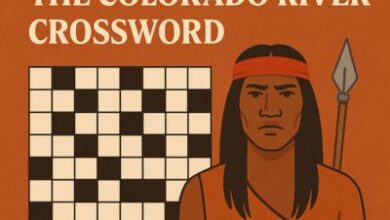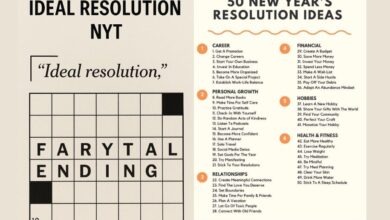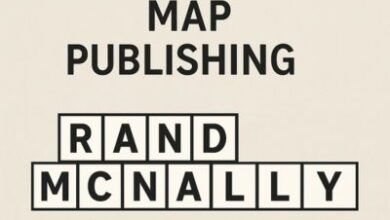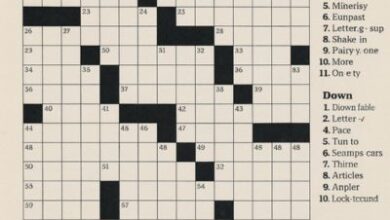Understanding the “Fighting Condition” Crossword Clue: Meaning, Answers, and How to Solve It
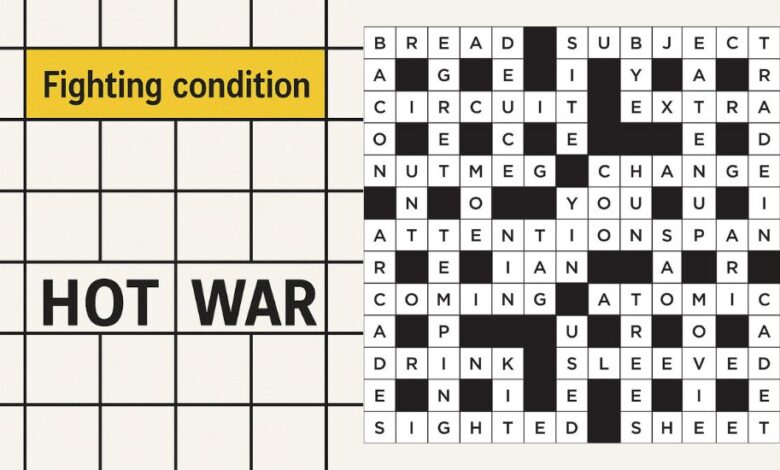
Crossword puzzles have long been a beloved pastime for word enthusiasts, blending logic, vocabulary, and lateral thinking into a challenge that’s both frustrating and rewarding. Among the many clues that stump solvers, “Fighting condition” has recently emerged as one of those deceptively simple yet intellectually intriguing entries seen in various crossword publications.
In this detailed analysis, we’ll dive deep into what the clue “fighting condition” means, explore its possible answers, understand how crossword setters build this type of clue, and share tips to help you decode similar puzzles in the future.
1. What Does “Fighting Condition” Mean in Crossword Terms?
At first glance, the phrase “fighting condition” might make you think of health — perhaps “fit,” “ready,” or “strong.” After all, the phrase “in fighting condition” is sometimes used to describe someone physically prepared for battle, as in “the boxer is in fighting condition.”
However, crosswords love to twist meanings. The key to solving this clue lies in realizing that “condition” doesn’t always refer to health. In the cryptic or wordplay sense, condition often means state or situation. So, a “fighting condition” isn’t about physical readiness; it’s about a state in which fighting occurs.
This clever shift in meaning is exactly why many solvers find the clue tricky at first sight. It’s short, simple, and appears straightforward — but like many great crossword clues, its surface meaning conceals a deeper definition.
2. The Most Common Answer: “HOT WAR”
The most widely accepted solution to the clue “fighting condition” is HOT WAR — a two-word answer (sometimes written as HOTWAR in six letters).
This clue and answer pair gained recognition when it appeared in major newspaper crosswords with the following form:
Clue: Fighting condition
Answer: HOT WAR
The reasoning behind it is elegant:
- “Condition” translates to “state.”
- A “hot war” is a state of active combat, as opposed to a “cold war,” which involves political tension but no direct fighting.
Hence, the clue’s logic is:
Fighting condition = State of active warfare = HOT WAR.
It’s concise, logical, and uses lateral thinking — hallmarks of an excellent crossword clue.
3. Why “HOT WAR” Fits Perfectly
The phrase “hot war” is well established in modern political language. It refers to a conflict involving actual combat — troops, weapons, and battles — unlike a cold war, which involves strategic rivalry without direct fighting.
Here’s how it breaks down semantically:
- Hot → active, heated, ongoing.
- War → fighting or armed conflict.
- Hot war → a condition where fighting is actively happening.
In short, “hot war” isn’t metaphorical; it literally means a fighting state. Crossword compilers love phrases that are both idiomatic and literal — and this one checks both boxes.
4. Alternate or Related Answers Seen Online
While HOT WAR is the most recognized answer, crossword clue databases and solver forums list several other possibilities depending on the puzzle’s context and letter count:
| Possible Answer | Letters | Meaning / Context |
|---|---|---|
| HOT WAR | 6 | Active state of fighting (most common answer). |
| HOTWAR | 6 | Variant of HOT WAR when grid disallows spaces. |
| COMBAT | 6 | Fighting itself (less precise but possible). |
| WARFARE | 7 | Condition involving war; thematic fit. |
| ON ALERT | 7 | Ready-for-fight condition (rare). |
In most databases, however, the clue “fighting condition” directly points to HOT WAR as the best match — particularly when the puzzle specifies “(6)” or “(3,3)” as the letter/word pattern.
5. The Wordplay and Logic Behind the Clue
Let’s analyze why “fighting condition” is such a smartly constructed clue.
Crossword clues typically consist of a definition and wordplay. In this case:
- The definition is the straightforward part — “fighting condition” = “state of active combat.”
- The wordplay element may rely on your understanding of condition meaning state.
The brilliance of this clue lies in its simplicity — there’s no anagram, hidden word, or homophone here. Instead, it’s a double definition-style clue:
- Condition → state.
- Fighting → war.
Combine them, and you get: state of fighting → HOT WAR.
This minimalism makes it perfect for both general and cryptic crosswords — easy to write, yet satisfying to solve.
6. “Condition” in Crossword Language
To fully appreciate this clue, it’s worth examining the word “condition” — a favorite among crossword compilers.
Depending on context, “condition” can indicate:
- Health → as in “fit,” “ill,” “well.”
- State or situation → as in “peaceful condition,” “economic condition.”
- Requirement → as in “terms” or “stipulation.”
- Verb form → “to condition” = to train or prepare.
Crossword setters love this flexibility because it allows for subtle misdirection. Most solvers first think of “health condition,” leading them toward words like FIT or WELL. Only later do they realize the clue is playing on state — a mental flip that makes the final “aha” moment so rewarding.
7. Linguistic and Historical Note: “Hot War” vs. “Cold War”
The term “hot war” originated during the Cold War era (mid-20th century), used to contrast the ideological, non-combat rivalry between powers (a “cold war”) with actual, armed conflict (a “hot war”).
For example:
- The Korean War (1950–1953) was a hot war within the broader Cold War context.
- The term implies the heat of battle, making “hot” metaphorical for activity and conflict.
This real-world background gives crossword clues extra depth — the answer isn’t just a word trick, it’s a phrase with political and historical resonance. Many crossword creators intentionally use such layered meanings to make clues feel richer.
8. How to Approach Clues Like “Fighting Condition”
Here’s a step-by-step guide for solvers tackling similar clues:
- Check the surface meaning but don’t trust it.
“Fighting condition” sounds like something about fitness — resist that first thought. - Consider alternative meanings of key words.
“Condition” might mean state or situation instead of health.
“Fighting” could refer to combat, warfare, or battle. - Think about idioms or two-word phrases.
Crossword editors often hide familiar phrases like HOT WAR, COLD FRONT, TIGHT SPOT, etc., behind deceptively simple definitions. - Look for letter count hints.
If the puzzle says (3,3), that’s your cue it’s a two-word answer like HOT WAR.
If (6), it’s the same phrase condensed into one. - Use crossing clues to confirm.
A “W” or “A” in a key position almost guarantees WAR plays a role.
By applying these reasoning steps, even ambiguous clues like “fighting condition” become approachable.
9. Broader Lesson for Crossword Enthusiasts
The clue “fighting condition” represents what makes crosswords endlessly engaging — they train you to see beyond the obvious. Every word in a clue has multiple meanings, and successful solving requires linguistic flexibility.
In this clue:
- Fighting doesn’t just mean combat, but could hint at hot, war, or battle.
- Condition can be state, mode, or circumstance.
- The combination produces a crisp, idiomatic answer that feels obvious only after you’ve solved it.
That’s the hallmark of a well-crafted crossword clue — it hides in plain sight.
10. Why Puzzle Writers Love This Type of Clue
From the perspective of crossword constructors, clues like “fighting condition” are elegant because:
- They use plain English.
- They mislead naturally, without awkward phrasing.
- They teach solvers to think laterally.
Additionally, clues like this are adaptable across puzzle types — general, cryptic, quick, or themed. A cryptic setter might reframe it as a surface hint toward “fit for battle,” while a quick crossword might use it as a definition clue.
The flexibility, precision, and brevity make “fighting condition” a favorite among modern puzzle editors.
11. Examples of Similar Crossword Logic
To improve your crossword-solving skills, compare “fighting condition” with similar clues that use word-twist logic:
| Clue | Answer | Explanation |
|---|---|---|
| “Fighting state” | HOT WAR | Same concept — condition = state. |
| “Cold war opposite” | HOT WAR | Uses direct contrast logic. |
| “Ready to battle” | ON ALERT | State of preparedness. |
| “Fighting fit” | WELL | Double meaning on health. |
These examples show that once you master how crossword setters use double meanings, you can predict their tricks across puzzles.
12. The Deceptive Simplicity of Two-Word Answers
Two-word answers like HOT WAR are among the most enjoyable in crossword solving because they seem obvious only after revelation. The clue feels almost unfairly simple, but that’s what makes it memorable.
The same pattern appears in other examples:
- “Freezing condition” → COLD SNAP
- “Burning desire” → HOT NEED
- “Uncertain condition” → GRAY AREA
Each one follows a structure where a descriptive adjective and a noun form an idiomatic phrase, often with metaphorical power. HOT WAR fits this structure perfectly.
13. Crossword Community Reactions
Across crossword blogs and forums, solvers have commented on the elegance of this clue. Many described “Fighting condition = HOT WAR” as a “clean and satisfying” clue that rewards lateral thought.
Writers who craft large-scale Sunday puzzles often use wordplay clues like this to engage both novice and expert solvers. The clue’s brevity and fairness make it an instant favorite for crossword enthusiasts.
14. Final Thoughts: The Beauty of Simple Wordplay
At its core, the “fighting condition” crossword clue is a reminder of what makes word puzzles enduringly fun — the thrill of discovery. It takes an everyday phrase, flips its meaning subtly, and asks the solver to join in the linguistic dance.
When you next encounter a short, seemingly plain clue, remember “fighting condition.” It may look simple, but within it lies a lesson in lateral thinking, precision, and the joy of wordplay.
Crosswords aren’t just vocabulary tests; they’re miniature works of logic and art. And clues like this — short, fair, and clever — show why the crossword continues to capture our imagination decade after decade.
About This Article
This piece was written for crossword enthusiasts, puzzle learners, and anyone fascinated by the craft of language.
For more deep dives into word puzzles, language, and reasoning tips, explore our blog at Newsta, where curiosity meets cleverness.
1. What is the answer to the crossword clue “Fighting condition”?
The most common and accurate answer is HOT WAR (sometimes written as HOTWAR in six letters). It describes a state of active fighting or warfare.
2. Why is the answer “HOT WAR”?
Because “condition” can mean “state,” and a “hot war” is literally a state of active combat — as opposed to a cold war, which involves no direct fighting.
3. Are there other possible answers to “Fighting condition”?
While HOT WAR is the best fit, other potential answers depending on the crossword’s context and length include COMBAT, WARFARE, or ON ALERT. However, these are less commonly used.
4. How many letters are in the answer “HOT WAR”?
“HOT WAR” is typically written as (3,3) or combined as HOTWAR (6) when spaces aren’t allowed in the crossword grid.
5. What type of clue is “Fighting condition”?
It’s usually a double definition clue — where both “fighting” and “condition” lead to the same concept: a state of war.
6. Where has this clue appeared before?
The clue “Fighting condition” has appeared in several major newspaper and online crosswords, including American Sunday puzzles and crossword-solving websites.
7. What does “hot war” mean in real life?
In real-world terms, a hot war refers to an active military conflict involving actual battles, as opposed to a cold war, which involves political tension without direct fighting.
8. How can I recognize clues like this in future puzzles?
Look for words such as state, condition, or situation, which can signal phrases like cold war, hot war, or gray area. These often refer to conditions or states rather than physical properties.
9. What kind of puzzles use this clue?
You’ll typically find “Fighting condition” in general knowledge or cryptic crosswords, especially those that rely on subtle misdirection or idiomatic phrases.
10. Why do crossword creators use simple phrases like this?
Because they’re easy to read but hard to interpret correctly — “Fighting condition” seems like a health clue at first, but actually hides a clever political or military phrase.
